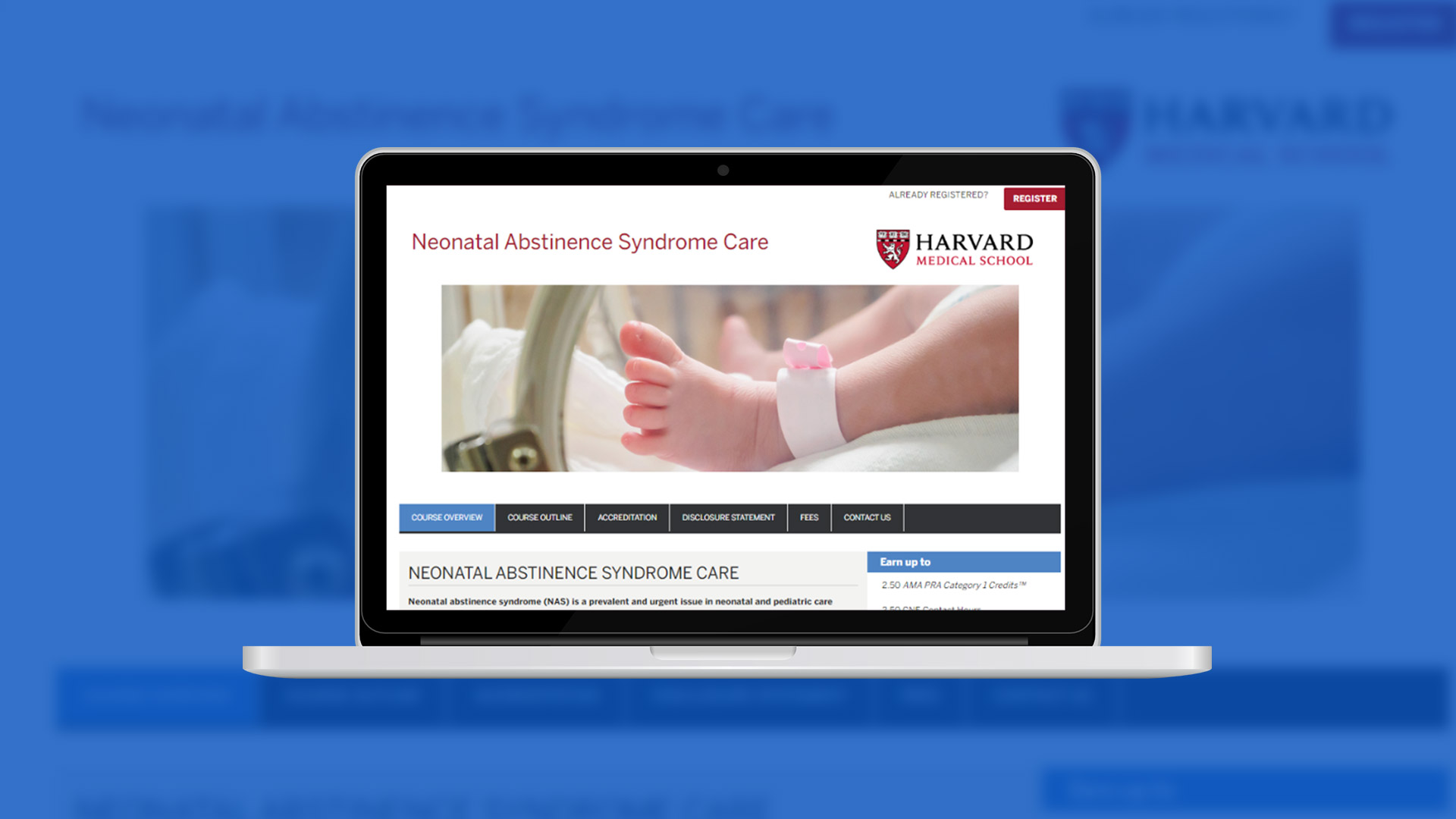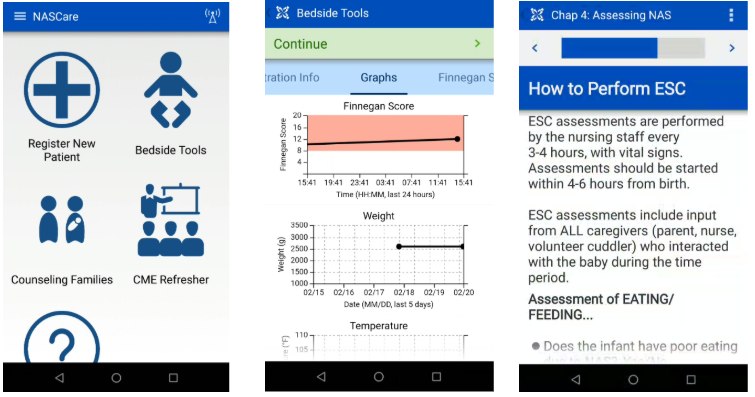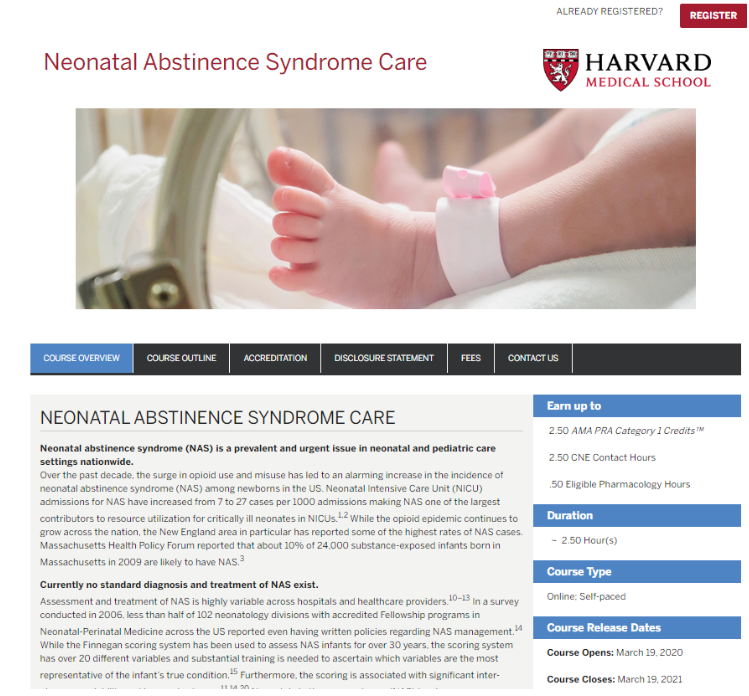Dimagi and Partners Develop Digital Resources to Support Infants Affected by the Opioid Epidemic

The incidence of babies born in the US addicted to opioids have increased at an alarming rate over the past two decades.
These babies often experience Neonatal Abstinence Syndrome (NAS), a constellation of drug withdrawal signs and symptoms that requires highly specialized care and treatment. Babies born with NAS need close monitoring and likely need more time in hospital intensive care units to address challenging symptoms like fevers, poor eating, sleeping difficulties, and excessive crying before they can be safely discharged.
NAS assessments are highly subjective and symptoms can be hard to interpret and score. And because new protocols and recommendations continue to emerge as the research in NAS evolves, the assessment and management of NAS varies dramatically across providers and hospitals. Digital health provides a way to address the challenge of standardizing care while supporting clinicians in providing the best individualized care for each baby and family.
Dimagi Develops NASCare with Partners
Over the past several years, Dimagi has been leading NASCare, a federally-funded project to design and develop digital tools and resources that can be used to support the care of infants with NAS. Through the NASCare project, the study team – which includes leading NAS experts and medical education development specialists at Tufts Medical Center, Harvard Medical School, Wake Forest School of Medicine, and Massachusetts General Hospital – has designed and developed a usable prototype application that may be deployed in hospitals to directly assist providers with the care of infants with NAS.
The prototype NASCare app, built upon Dimagi’s CommCare platform, allows clinicians to conduct guided NAS assessments of infants with NAS, obtain evidence-based recommendations on non-pharmacological and pharmacological treatment, and access counseling material for families of infants with NAS.
As the primary users, nurses working in Neonatal Intensive Care Units (NICUs) or Special Care Nurseries (SCNs) will be able to use NASCare for a step-by-step, streamlined experience in assessing the status of infants with NAS. NASCare supports the two most prominent assessment protocols, and can be flexibility adapted as new protocols emerge or existing ones change. Physicians are able to view a record of assessments and can review automated recommendations as they make decisions about treatment.

The NASCare application was developed through a robust, user-centered design process that Dimagi uses in many of its projects. The approach involves several stages that build on each other:
- Stage 1: Informational interviews and requirement gathering with key stakeholders and potential users
- Stage 2: Prototype development
- Stage 3: Usability testing with target users and iterative revision
The NASCare project also provided the opportunity to gather detailed data on what usual care for infants with NAS looks like. The study team conducted almost 200 hours of detailed observations of care for infants with NAS across three facilities. The data from these observations will contribute to an emerging body of research on how infants with NAS are treated, and will inform future work on the NASCare system. Further research is needed to determine the efficiency and effectiveness of the application and to prepare it for live deployment in the hospital setting.
New Online Course for NAS Training

As part of this project, the team has also successfully developed Neonatal Abstinence Syndrome Care, a self-paced online course. The course is available through Harvard Medical School’s online continuing education platform and is certified for Continuing Medical Education (CME) and Continuing Nursing Education (CNE) credit. The course content has also been adapted and included as part of the NASCare app to support and reinforce key information about NAS.
The main modules of content include:
- Epidemiology and Pathophysiology
- Clinical Presentations
- Toxicology
- Assessing NAS
- Pharmacologic and Nonpharmacologic Interventions
Each module provides an overview of important clinical information, and features a knowledge check which uses case studies to reinforce the course material. A final post test certifies that the learner understands the course objectives and is eligible for continuing education credits.
Standards of care for NAS are rapidly changing as research improves our understanding of the most effective treatment protocols. Short, accessible online courses like this one can help nurses and doctors stay on top of the latest best practices and guidelines.
Learn More
The CME-/CNE-accredited course is now available on Harvard Medical School’s website and more information on Neonatal Abstinence Syndrome can be found on the NIDA website.
This project has been made possible with funding from the National Institutes of Health, National Institute of Drug Abuse through the Small Business Innovation Research (SBIR) program (Contract #HHSN271201700065C).
Interested in learning more about this project? Please contact the NASCare team at nascare@dimagi.com.
For other information about Dimagi, contact info@dimagi.com.
Share
Tags
Similar Articles
Tackle Africa - The CommCare Grant Awardee on Transitioning from Paper to Digital
Explore the impactful work of Tackle (formerly TackleAfrica), a renowned NGO leveraging football to deliver HIV and Sexual & Reproductive Health & Rights (SRHR) information and services to young people across Africa, and learn about their transition from paper to digital data collection through the CommCare Research Grant.
Dimagi Partner Blog
April 19, 2024
Amplifying Early Childhood Development with CommCare: FCW's Digital Transformation
The FCW Early Childhood Development program provides home visitors with training on how to leverage CommCare for digital transformation
Dimagi Partner Blog
April 11, 2024
World Poultry Foundation’s guide to Implementing a Self-Service Digital Solution
Learn how the World Poultry Foundation addressed challenges in collecting real-time data from the field. Explore their journey to find an affordable, sustainable mobile digital solution and gain valuable insights along the way.
Dimagi Partner Blog
January 26, 2024